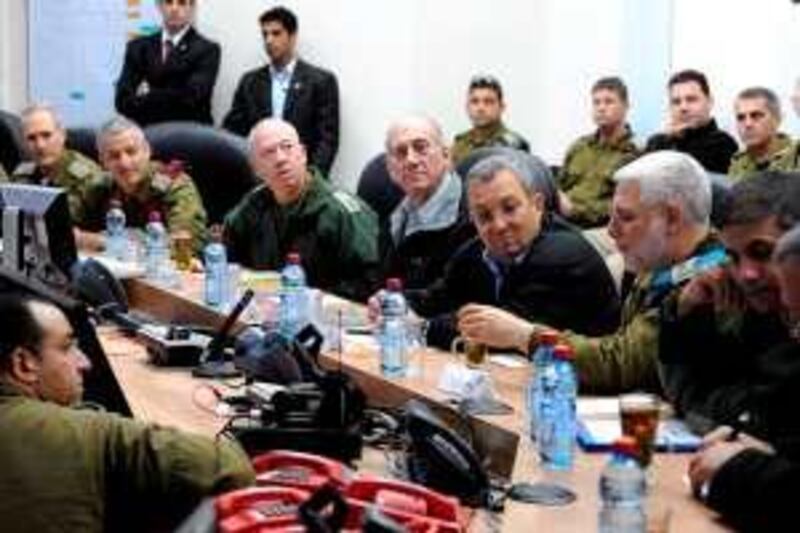Tel Aviv // Israel rejected international calls yesterday to temporarily halt its attacks in the Gaza Strip, despite reports that the Jewish state's top leaders are divided on whether to suspend the strikes that so far have killed more than 390 Palestinians in the impoverished territory. The diplomatic pressure on Israel to cease its offensive increased as the country continued its massive aerial strikes for a fifth day yesterday on the territory ruled by the Islamist group Hamas, whose shaky, six-month-old truce with Israel expired on Dec 19. Ehud Olmert, Israel's prime minister, ruled against a request raised by Bernard Kouchner, France's foreign minister, for a two-day halt to the operation. Mr Kouchner spoke about his proposal with Ehud Barak, Israel's defence minister, in two phone calls on Monday and Tuesday, calling for Israel to unilaterally stop its campaign in order to allow medication and other humanitarian aid to enter the besieged seaside enclave of 1.5 million residents. The members of the Middle East Quartet - the United States, Russia, the European Union and the United Nations - also demanded a halt to the campaign that Israel launched in a bid to stop rocket fire by Gaza militants on its southern communities. In a push of his own, Recep Tayyip Erdogan, Turkey's prime minister, said yesterday that he is meeting with the leaders of Middle Eastern countries including Syria, Jordan and Egypt for talks on ending the hostilities. Mr Olmert, in remarks made after the government's security cabinet convened yesterday and rebuffed the French plan, said the conditions were not yet right for a ceasefire, but he did not rule out one in the future. "If conditions will ripen, and we think there can be a diplomatic solution that will ensure a better security reality in the south, we will consider it. But at the moment, it's not there," a senior aide to the premier quoted him as saying. Mr Olmert added that Israel "didn't start this operation just to end it with rocket fire continuing as it did before it began ? imagine that a few days after we unilaterally stop the operation, a barrage of rockets hits Ashqelon". Meir Sheetrit, the interior minister and a member of the security cabinet, told Israel Radio yesterday that "there is no room here for zigzagging ? we need to continue the operation without fear until we reach our target". Nevertheless, Israeli officials said they were open to discussing changes to France's proposal or to receiving alternative plans from the international community. Tzipi Livni, Israel's foreign minister, plans to travel to Paris today to meet with Nicolas Sarkozy, France's president, to talk about the country's proposal. Mr Kouchner said yesterday that he and Mr Sarkozy might visit Israel next week for more talks. Israeli media reported yesterday that Mr Olmert and Ms Livni voiced opposition to France's proposal during a meeting late on Tuesday with Mr Barak, who favoured accepting the request. Mr Barak would like a temporary lull, the reports said, because he is hesitant to proceed with a ground operation amid concern that it could exact high casualties among soldiers and because the stormy weather in Israel's south would make an invasion more difficult. Discord about a temporary or permanent halt to the operation may also be rooted in the rivalry among Israeli leaders ahead of February's national election. Analysts say that Ms Livni, head of the ruling centrist Kadima party that is trailing the right-wing Likud party in polls, has drawn more support since the start of the operation, which is overwhelmingly backed by the Israeli public. Mr Barak, head of the left-of-centre Labor Party that polls show is far behind Kadima and Likud, has also gained popularity in recent days for orchestrating the offensive, and stands to lose the most politically if the mission were perceived as a failure. The left-wing Haaretz newspaper wrote yesterday that the argument about whether to accept a truce "is driven by the deep disdain between most of the players on the Israeli side, by the charged competition for voters' support and by much disorder in the decision-making process". The newspaper added that the dispute is a reminder of a similar discord that took place during Israel's 2006 war against the Lebanese militant group Hizbollah. At that time, it was Ms Livni who had sought to embark on a diplomatic process to end the war four days after it began. Mr Olmert, however, had refused. In Gaza, Hamas officials said they would back any initiative that would halt Israel's military campaign and call for the Jewish state to lift its blockade on the territory. Israel's media yesterday cited unidentified defence officials as saying that the Gaza strikes have so far destroyed a third of the some 3,000 rockets in Hamas's arsenal. According to the reports, the air force has hit most of its planned targets in Gaza, and there was not yet a decision on if and when to launch a ground invasion. Yuval Diskin, the chief of Israel's internal security services, told the security cabinet the attacks have "badly impaired" Hamas's ability to rule in Gaza, with the group's weapons facilities "completely wiped out" and a network of smuggling tunnels battered. Still, the apparent division among senior government officials on when to end the operation prompted Ofer Shelakh, an Israeli commentator, to say yesterday that the country's leadership is repeating a mistake it committed during the war in Lebanon in 2006 - going in without a clear strategy on when and how to get out. "In practice, Israel knows how to say that she wants Hamas to stop firing and arming itself for a long time," he wrote in the news website NRG. "But she can't say how she'll know when that has happened." vbekker@thenational.ae
Ceasefire rejected amid split in Israel
Israel rejected international calls yesterday to temporarily halt its attacks in the Gaza Strip.

Editor's picks
More from the national




